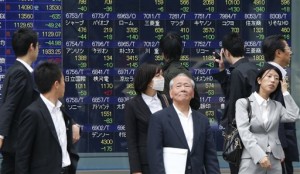
Passers-by watch an electronic stock board of a securities firm in Tokyo, Thursday, May 30, 2013. Japan’s Nikkei 225 index closed down 737.43 points, or 5.15 percent, at 13,589.03 on Thursday as concerns that the Federal Reserve might start scaling back its stimulus program due to improvement in the U.S. economy sent Asian stock markets lower. (AP Photo/Koji Sasahara)
BANGKOK — Asian stock markets were choppy Friday after lackluster U.S. economic reports raised expectations that the U.S. Federal Reserve would stick to its aggressive stimulus policies.
U.S. unemployment claims rose and first-quarter growth was revised lower Thursday, which in a perverse turn of events was encouraging for investors who want to see the Fed continue its mammoth purchases of government bonds to support the U.S. economy.
The Fed’s $85 billion-a-month purchases are aimed at keeping interest rates low to spur borrowing and investment. The efforts have boosted stock markets, where investors have turned for returns beyond what bonds are paying.
Japan’s Nikkei 225 rose 1.6 percent to 13,802.51 after shedding more than 5 percent the previous day. South Korea’s Kospi advanced 0.2 percent to 2,004.64. Australia’s S&P/ASX rose 0.2 percent to 4,940.30. Benchmarks in New Zealand and the Philippines rose.
Still, some analysts said it was worrying how investors plowed into stocks despite the negative economic reports.
“It is concerning that markets are reacting to data this way. Bad news should be seen as bad news,” said Evan Lucas of IG Markets in Melbourne.
Hong Kong’s Hang Seng fell 0.1 percent to 22,461.85. Benchmarks in Indonesia and Singapore fell.
On Thursday, U.S. economic growth in the first quarter was lowered to an annualized rate of 2.4 percent from 2.5 percent while weekly jobless claims rose by 10,000 and pending home sales gained by far less than anticipated in April.
Most economists think U.S. growth is slowing to around a 2 percent annual rate in the April-June quarter as the economy adjusts to federal spending cuts, higher taxes and further global weakness. Still, many say the decline may not be as severe as once thought. That’s because solid hiring, surging home prices and record stock gains should keep consumers spending.
Traders are also keeping an eye on China. Its official manufacturing index for May is to be released on Saturday. A similar survey by HSBC Corp. issued last Thursday showed China’s manufacturing contracted to a seven-month low of 49.6 from April’s 50.4 on a 100-point index. Numbers below 50 show a contraction.
Andrew Sullivan of Kim Eng Securities in Hong Kong said traders were keeping their expectations in check for China, since as a huge exporter it is sensitive to global economic weakness.
“As long as it’s not far off the 50 mark, I don’t think people will be too worried,” Sullivan said of the China manufacturing index.
On Wall Street, the Dow Jones industrial average rose or 0.1 percent to close at 15,324.53 on Thursday. The Standard & Poor’s 500 index rose 0.7 percent to 1,654.41. The Nasdaq composite index rose 0.7 percent to 3,491.30.
Benchmark oil for July delivery was up 23 cents to $93.84 per barrel in electronic trading on the New York Mercantile Exchange. The contract rose 48 cents to close at $93.61 per barrel on the Nymex on Thursday.
In currencies, the euro was down at $1.3033 from $1.3043. The dollar rose to 101.02 from 100.96 yen.